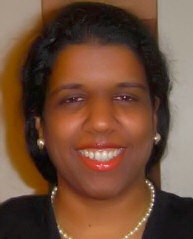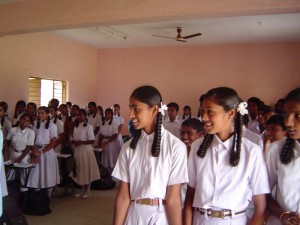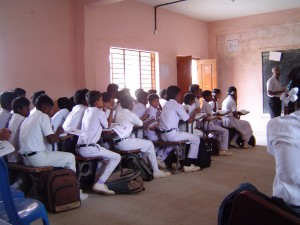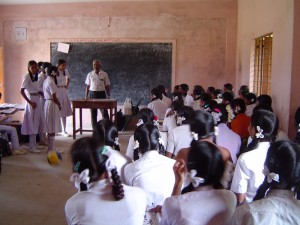Contribute
| In Conversation With Melli Annamalai |
Nirmala Garimella
11/18/2015
(This article is sponsored by Tanna Insurance)
I have been actively involved in Asha for Education since the late 90s. I believe strongly in the mission. At an individual level education gives disadvantaged children an opportunity to break away from forces that hold them back, enabling economic and social mobility. At a societal level education is an essential foundation to participate in the 21st century knowledge economy. Any kind of economic development and social progress requires an educational system that promotes reasoning, rational thinking, creativity and innovation. I have held many positions within the local Asha chapter and in the world-wide Asha organization, including serving as world-wide president. Currently I am deeply involved with projects implemented in India. My experience has given me a deep understanding of the challenges facing education in India, particularly in the government school system which is essential for scale. Over 70% of India’s children go to government schools, and in many rural areas that is the only option. How did Oracle get involved with this grant? Oracle wants to achieve equity in education for disadvantaged children, particularly focusing on STEM and Computer Science related programs. To achieve this in India Oracle wants to forge national-level partnerships with proven and effective organizations. One of the organizations Oracle reached out to was Asha for Education. One of their motivations was the high number of their employees who volunteered with Asha and/or donated to Asha - their employees’ trust in Asha for Education was important to them. With this grant Oracle is investing in improvement of Science and Math education in government schools in India. This grant makes possible the scaling up of successful innovations Asha for Education and project partners have been implementing to reform government schools, particularly in Science and Math education. Who are the other project partners? Asha for Education’s practice is to closely partner with organizations working on educational needs specific to a region or community. The partner organization is typically a highly respected and well-established organization in the area, with a deep understanding of the local needs and challenges. The two project partners we chose for this grant were interested in working in Science and Math education improvement in government schools. Asha has worked with them on related projects on improving government schools over the last decade. · Swami Viveka Youth Movement (www.svym.org, was bestowed the best NGO in India award in the India NGO Awards 2015 event, organized by Resource Alliance.) · Deenabandhu (www.deenabandhutrc.org) Asha hopes to address the extremely poor quality of learning, by enable and empowering teachers. There are innumerable teacher training programs conducted by various agencies. But the training is often not directly relevant to the challenges the teachers face. The training programs rarely include teachers as equal participants, and employ the same top-down methodology as always. The programs focus on providing material, without encouraging questions and discussions on any topic. Teachers have gone through the same poor quality education system themselves, and just follow the same methods they followed in their schooling, and since they don’t learn anything different in the training programs the problem has become cyclical. To achieve change that scales to large numbers of schools, this cycle has to be broken. Teachers have to themselves understand the value of equal participation in a learning environment, the value of using many different tools and go beyond the textbook to understand a concept, the value of asking questions. We incorporate this in our training programs for a fundamental paradigm shift. A key Asha goal is to enable and empower these teachers with this new training paradigm. In our work teachers are equal participants at every step, and we help them feel they can be successful and help them be successful, breaking through the apathy that envelopes them. Once the teachers themselves experience the joy of learning, and realize that learning how to learn is the most critical aspect of education, once they see that they can be successful in their job, their apathy is broken and things start progressing rapidly towards change. Teachers have become very eager participants in our programs, taking on many initiatives as they work with us. The WhatsApp teachers group at the SVYM project is constantly buzzing with activity, shattering the mental image we have of apathetic government school teachers. Government schools have given the project coordinators awards to thank them for making schools a vibrant place once again. Education administrators are also closely involved, and they have begun to voluntarily ask for our help in other blocks and taluks. This type of systemic change can be permanent. With the Oracle grant we are able to scale these innovations and cover all schools in a given area. Finally our goal is to build on the initiatives in these areas and create replicable processes that can be implemented in other parts of India. Can you sharea story on the present problem ? Neelamma is excited about starting high school. Her parents were going to let her take the bus to the village 10 miles away, because almost everyone in the village takes the bus to go the high school. Her high school class is big, with 60 girls and 40 boys. Her parents were happy there were so many girls. She does not understand many of the words and symbols and diagrams in her new textbooks, but she can make out just enough to memorize the teacher’s dictated answers. She has virtually no access to any lab, so she learns Science by memorizing the textbook, instead of figuring out experimentally how light bends, what is in a plant cell when she dissects it, or how a magnet works. Her questions can barely be answered by teachers, because they have been through similar schools themselves, and have limited access to resources to improve their own learning of content. This continues till class X, where Neelamma barely passes Science and Mathematics. Neelamma will either stop her education here, or study Arts or Humanities or Commerce, more amenable to memorization. She never really understood Science and Mathematics in school, nor will she in the future. We have lost a curious and agile mind who will never know the joy of scientific discovery in any discipline. This is the reality in many government high schools. The question is not any more ‘can this child go to school?’ The question is ‘what will this child learn at school?’ Children are going to school in huge numbers, packing classrooms with eager faces, excitement, curiosity, and a desire to learn. The numbers who study Science drops precipitously after class X, because they have not learnt Science or Maths and have only developed a fear of the subjects which in turn means there are not enough Science teachers in rural government schools, further compounding the problem. There is an immediate and urgent need to fix this problem. To contact the Boston chapter of Asha please write to boston@ashanet.org or visit their Facebook page at https://www.facebook.com/bo
You may also access this article through our web-site http://www.lokvani.com/




